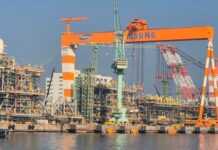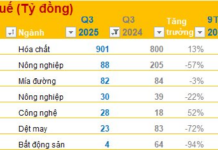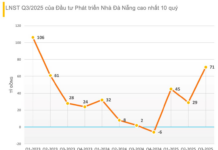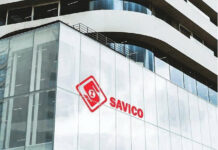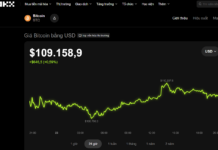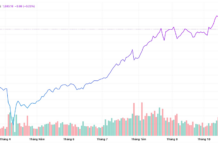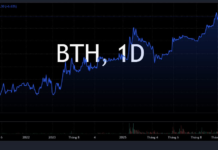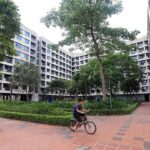
Chairman of the Board of Directors Le Viet Hai.
|
That was the message that the Chairman of the Board of Directors of Hoa Binh Construction Corporation Group (HOSE: HBC) stated in the 2023 annual report when talking about the upcoming orientation in conquering the overseas construction market, after a “stormy” period that the construction enterprise is going through.
According to Mr. Hai, in the past year, HBC has been striving to approach and develop the foreign market. At the beginning of 2024, the Company received a letter of intent to award 5 social housing construction projects from the Ministry of Lands, Public Works, Housing and Urban Development of Kenya with a total investment of 72 million USD (approximately 1.8 trillion VND). After Kenya, there will be projects in the United States, Australia, Canada and many other countries.
The Chairman of HBC cited figures from The Business Research Company, the global construction market in 2022 was valued at 14.3 trillion USD and is forecasted to increase to 26 trillion USD by 2032. While in 2023, the Vietnamese construction market accounted for 7.5% of GDP, approximately 32 billion USD (according to the report of the Ministry of Construction), only equivalent to 1/450 of the total output value of the world construction industry. This is one of the reasons why HBC decided to export the construction industry overseas.
Confessing in the letter, the Chairman of HBC said that the Group had just gone through the stormiest and most challenging year in its 36 years of establishment and development, even some difficulties had begun since 2017. The competition in the market has become fiercer than ever.
“Many contractors have bid at prices lower than the capital by up to a few dozen percent. Quite a few large contractors have used unfair competition tactics to win the project,” emphasized Mr. Hai, stating at the same time that he had received sympathy and risk sharing, as well as facilitation, from many partners during the difficult period.
Taking responsibility for the 2023 plan failure
As of April 18, 2024, over 99 suppliers and subcontractors had agreed to sign a memorandum of understanding to exchange debts for HBC shares, valued at 660 billion VND.
Last year, the Company continued to ensure its responsibility to project investors, with no projects violating safety, quality or progress. HBC was also not subject to any contract performance guarantees from banks nor overdue debts to banks, and was not transferred to the bad debt group.
“As the helmsman of Hoa Binh, I would like to sincerely take responsibility for the fact that in the past year of 2023, I have not been able to develop the Company according to the set goals and plans. I would like to affirm that, as the founder, I always consider Hoa Binh as my beloved and precious child, and throughout the past 36 years, especially in 2023 with many challenges and difficulties, I have always tried my best, doing everything possible to steer the Hoa Binh boat through the storm, and at the same time committing to always protecting the highest interests of the shareholders,” concluded Mr. Hai.
Equity of 5.5 trillion VND?
The result from the 2023 audited financial statements was perhaps one of the biggest shocks to HBC shareholders when the equity at the end of last year was only over 93 billion VND, despite reaching nearly 1.2 trillion VND at the beginning of the year.
The reason for the decline in equity stems from the application of Vietnamese accounting standards from a very cautious perspective, but according to Mr. Hai, this figure is completely different from the actual situation.
Specifically, according to the management financial report prepared by HBC‘s Finance and Accounting Division based on the specific characteristics of construction activities and data and figures that are close to the reality of the market as well as the Company, the equity of HBC is currently around 5.5 trillion VND, nearly 60 times higher than the figure in the audited financial statements.
The reason for this difference, firstly, is that the prices of real estate are valued at market prices, while the audited financial statements are recorded at original cost (i.e., according to the original price or in other words, the initial purchase price).
But in reality, the Vietnamese real estate market has witnessed continuous price increases for many years. This recording method has caused a huge difference between the 2 reports. For example, the headquarters at 235 Vo Thi Sau, District 3, HCMC, according to the books, is only 5 billion VND, but the current transaction price is not less than 75 billion VND, a difference of up to 15 times.
In addition to real estate, the valuation of HBC‘s fixed assets in the audited financial statements is also much lower than the actual value, and many fixed assets are not included in the valuation of equity, which makes the equity much lower.
According to the management report, the current market price of real estate is 4.7 trillion VND, while the audited financial statements only record 2.4 trillion VND, a difference of 2.3 trillion VND.
Secondly, the remaining value of machinery and equipment recorded in the audited financial statements is not consistent with the actual situation due to 2 main reasons: the depreciation value according to the current auditing regime does not accurately reflect the actual depreciation, and the price slip in the market also affects this remaining value.
According to HBC, many machinery and equipment have been fully depreciated and recorded in the books as zero, but in reality, they are still working very well. On the other hand, the current purchase price in the market is much higher than the original price (the previous purchase price), so the difference in the remaining value of these machinery and equipment is very large between the 2 reports, up to more than 1 trillion VND.
Thirdly, the provisions for bad debts according to the current accounting regime are determined by the age of the debt, while according to the management report, HBC makes an assessment based on the reason for late payment, the guarantee of the quality of the construction, the level of completion of the payment settlement documents, the financial capacity and business risks of the customers, as well as the specific characteristics of business operations in the real estate sector and the level of impact on HBC‘s debt collection ability.
In addition, the construction “giant” said it had never written off any receivables in its history. The specific difference in the write-back of the provision for doubtful debts is 1.4 trillion VND.
Finally, HBC‘s assessments are also based on experience in resolving debt collection lawsuits, of which a typical case is the debt of over 5 years (according to the regulation, a 100% provision has been set up) of FLC. The Company said that it not only recovered 100% of the principal but also collected interest and penalties worth up to 58% of the principal. The difference between the receivable recorded in the books and the value of the court’s judgment is 652 billion VND. According to HBC, this is a fully recoverable debt and will increase equity.
| Changes in equity and net income of HBC from 2003 to present |












